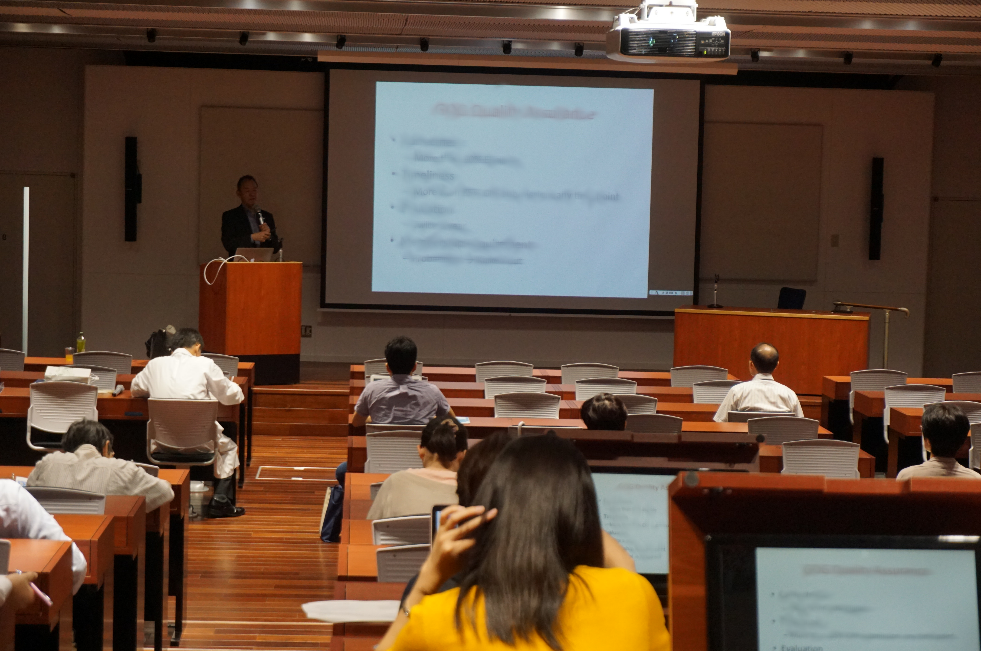The motivating lecture “MRCT, in Gynecological Tumor Areas”
On Thursday, Sep. 28th, 2017, the 7th Academia Clinical Development Seminar was held at the Multi- Media Hall in the Center of Medical Innovation and Translational Research. We invited Professor Keiichi FUJIWARA as a lecturer from the International Medical Center at Saitama Medical University, who is the university’s senior of GCRSO’s head, Dr. Daisaku NAKATANI. We had heard that he is a passionate professor. We were very excited about his lecture. The title of his lecture was “Multi-Regional Clinical Research (hereinafter MRCT) in Gynecological Tumor Areas”.

Gynecological cancers have a low frequency of occurrence, but they are not so rare that you cannot designate them as “Orphan disease” which means rare disease. That is a world-wide common recognition so Investigator-Initiated MRCT is being conducted proactively.
Indeed, since the late 1990's, MRCT at the academic level has been actively conducted. Japan has been participating in the GOG Japan Project since 2001 under the US multi-center clinical trial group (specialized in gynecologic oncology) network (Gynecologic Oncology Group, GOG). Professor Fujiwara was involved in its projects.
His episodes that he had experienced in the projects did not fail to meet our expectations. Based on his experiences of working together in MRCT, developing connections with overseas friends and performing an academic trial, above all, in order to improve the infrastructure for MRCT, Professor FUJIWARA clearly explained to us that it is critical to have outstanding persons who are familiar with ICH-GCP and who can communicate in English are indispensable to the GOG Oncology Japanese team.
Indeed, when the investigational product was sent to Japan for the first time by the National Cancer Institute (NCI), the regulators had not had such a case so far and successfully addressed the bitter experiences. Since then, Professor Fujiwara has also told us about the experience of regulatory authorities without having any indication about problems on drugs sent from the NCI.
In addition, Professor Fujiwara delivered a stimulating lecture about an encounter with team mates, who worked with him at the GOG Japan Project, lead to the present success.
Regarding the acquisition of funding, which is one of the most difficult experiences, he said that he could understand the hardship of the presidents of small and medium sized enterprises. Having mingled feelings of joy and sorrow in the story of each, we received a comment from one audience: "I was very encouraged, because he had a difficult story when conducting the MRCT."
In the question-and-answer session, there was a question on what is the difference in an audit between Japan and other countries. Professor FUJIWARA instantly answered that the audit is not done to punish, but to improve the insufficient situation at present. The audit (educational audit) is an educational opportunity to keep the trials and to go through with sufficient data quality. Foreign auditors always explain this at the beginning of each audit. Thus, not only the questioner but also every attendee was fully convinced. In addition to conducting MRCT, the lecturer also told us about the experiences planned by himself, and the audience was totally satisfied by the informative lecture.

The next 8th Academia Clinical Development Seminar will be held on Thursday, October 19th, entitled "The Current Status and Issues of Multi-Regional Clinical Trials from the Viewpoint of the Pharmaceutical Company.” The lecturer is Mr. Koji SHA from the Japan Boehringer Ingelheim Co., Ltd. Clinical Development & Medical Affairs Department. We are looking forward to your participation. Thank you.


